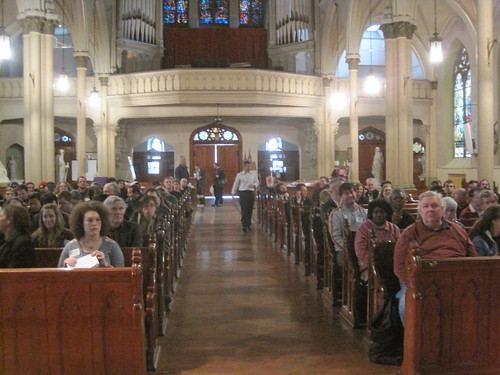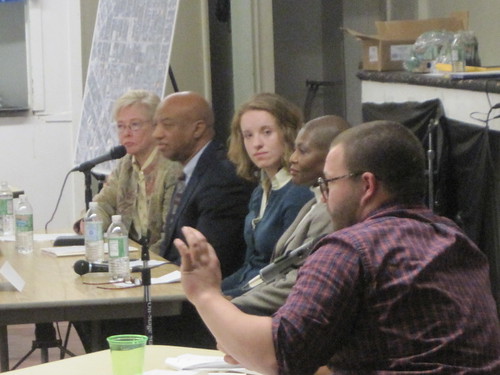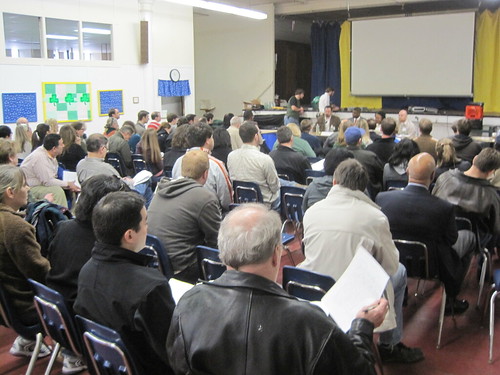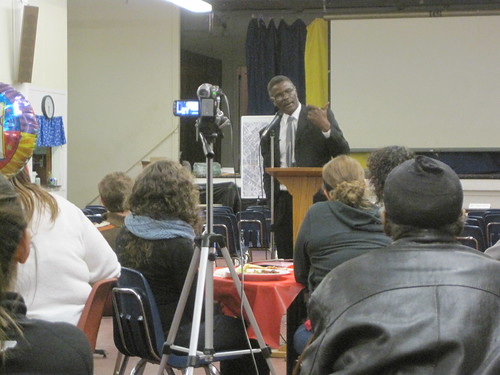by Michael R. Allen

Yesterday I had the pleasure of joining Paul J. McKee, Jr., Antonio French and Stephen Acree for the panel on “Regeneration” during Open/Closed, a groundbreaking conference on vacant property in St. Louis. Perhaps the majesty of Joseph Conradi’s design of the Most holy Trinity Church sanctuary prevented any expected rancor, but I credit both the deft moderation of Cynthia Jordan and the spirit of the conference itself for leading the discussion away from any predictable drama.

Drama would have been a distraction. I confess to wanting deliberately to focus on specific goals and actions during what was often an abstract — but healthy — conversation. The reason for this was that Open/Closed showed how much common ground exists between people supposedly diametrically opposed in goals. What I heard was that most panelists want to dream big but work hard, and everyone wants to revitalize the economy of the city as well as cure its cultural defects. Vacant property is a huge problem, but we all know that it is a symptom of regional stasis and city disease that we must end.

We have a lot of work ahead, and we need to develop the 21st century approach to renewing St. Louis. Every panelist and speaker at Open/Closed is working on a version of that approach, sometimes — as with Paul McKee, Jr. and I — in conflict. Differences in approach are not big problems so long as there are so few people searching for a new way forward. Our challenge is to use our common ground to grow the number of people and resources being deployed to transform the city and make the region a national magnet. We can debate the finer points of Land Reutilization Authority policy or Northside Regeneration’s development program, but until there is robust demand for vacant land held by the city, McKee or anyone else, we are chasing minor targets.

The challenge ahead is transforming such wide agreement on the major problems facing St. Louis into workable actions. Otherwise we are just having lovely conversations about some very ugly problems that will continue to worsen. I hesitate to offer a string of abstract things we need to do to rebuild city government, cut through racism, rally behind entrepreneurs and other things that people talked about this weekend. The bottom line really is that anyone who recognizes that vacancy in St. Louis — especially the intensive abandonment of north St. Louis — is the symptom of a declining culture has to get to work rebuilding that culture. Some of us can afford to have our family foundations target grants or loans, others can start organizing block units, some can buy and rehab vacant buildings and others can use their official positions to create policies that direct scarce resources to neighborhoods that actually need targeted public money. (Oh, and we all can vote.) The problem in enormous, but the cure is collective.
I commend Next STL, Frontier St. Louis, Rebuild Foundation and the other organizers of Open/Closed. Your work itself is an action step — the next step is ours.

5 replies on “Open/Closed Conference Highlights Common Ground, Need for More Action”
Thanks for keeping everyone informed about this Michael. One thing that might help is to utilize the format of the City of London Unitary Development Plan for the format for a new plan for North St.Louis (and the whole city for that matter)
http://www.cityoflondon.gov.uk/Corporation/LGNL_Services/Environment_and_planning/Planning/Planning_policy/udp.htm
It is based on strategic goals in all of the various areas of urban development. There are few maps. It is mostly the strategic goals themselves in text form. It is a format easily duplicated online, (as well as in meetings), especially with this template already in existence.
If a citizens plan was developed by leaders such as yourself and those you mentioned in your post, along with input from the community, it could offer an alternate to city plans (which are almost nonexistent) and help establish a blueprint for new development.
That is the problem with McKee is the lack of an overall concept or concepts for citizens to support.
The Unitary Development Plan addresses the complexity of urban planning from housing to shopping, transport and movement, recreation and leisure and much more as strategic goals.
The problem with the focus on vacant land in that new taxes or fees or whatever may or may not succeed depending on the context.
Maybe some other idea would work other than a unitary plan, but in any case the vacant land is also an opportunity to rethink transit, build public squares, emphasize walking neighborhoods, or whatever is decided.
A positive plan is needed.
A positive plan can spur development
Maybe a competing plan against McKee and ask the state to give the tax credits to that new entity.
With Alderman French involved, it may be the city would want to be a partner. Either way this is a method where the citizens can establish their own plans to replace city governance.
I don’t think citizens can wait on government any longer.
The City of London Unitary Plan is a great format and the work is already half done.
Thanks for keeping everyone informed about this Michael. One thing that might help is to utilize the format of the City of London Unitary Development Plan for the format for a new plan for North St.Louis (and the whole city for that matter)
http://www.cityoflondon.gov.uk/Corporation/LGNL_Services/Environment_and_planning/Planning/Planning_policy/udp.htm
It is based on strategic goals in all of the various areas of urban development. There are few maps. It is mostly the strategic goals themselves in text form. It is a format easily duplicated online, (as well as in meetings), especially with this template already in existence.
If a citizens plan was developed by leaders such as yourself and those you mentioned in your post, along with input from the community, it could offer an alternate to city plans (which are almost nonexistent) and help establish a blueprint for new development.
That is the problem with McKee is the lack of an overall concept or concepts for citizens to support.
The Unitary Development Plan addresses the complexity of urban planning from housing to shopping, transport and movement, recreation and leisure and much more as strategic goals.
The problem with the focus on vacant land in that new taxes or fees or whatever may or may not succeed depending on the context.
Maybe some other idea would work other than a unitary plan, but in any case the vacant land is also an opportunity to rethink transit, build public squares, emphasize walking neighborhoods, or whatever is decided.
A positive plan is needed.
A positive plan can spur development
Maybe a competing plan against McKee and ask the state to give the tax credits to that new entity.
With Alderman French involved, it may be the city would want to be a partner. Either way this is a method where the citizens can establish their own plans to replace city governance.
I don’t think citizens can wait on government any longer.
The City of London Unitary Plan is a great format and the work is already half done.
Michael, many of my same sentiments as well. While we may not all agree, it was indeed a meeting headed in the right direction. It was also good that reverence was given to the sanctuary, time for more dialogue vs drama. We need black, white, all minorities, low to moderate, middle and dare I say, upper income individuals working together. With the release of our most recent census figures we should all have an urgency to work together. The longer solutions don’t become the order of the day and we get stuck on majoring over the minors, the longer some of the “precious abandoned and vacant jewels” we’ve all driven by daily, lay bare to the elements. This leaves little hope for anyone to be able to afford to restore them or allows them to reach the point of no return with the only option being to tear them down.
Our population has shown a steady and consistent decline since the 70’s, long before Paul McKee came along. We are at a point where scattered site homes won’t do. There’s so much work to be done that individual, small, mid-sized and large developers must work in tandem. The northside will take the idea of block by block development to a different level, since we do indeed have areas where there are entire blocks that are totally vacant.
There is indeed COMMON GROUND and I am looking forward to many more productive dialogues that lead people to continued action. Let’s make our challenges opportunities for a bigger and better St. Louis, we can and we must! Good to see you, Paul McKee, Stephen Acree and Antonio French sit on the same panel!
Michael, many of my same sentiments as well. While we may not all agree, it was indeed a meeting headed in the right direction. It was also good that reverence was given to the sanctuary, time for more dialogue vs drama. We need black, white, all minorities, low to moderate, middle and dare I say, upper income individuals working together. With the release of our most recent census figures we should all have an urgency to work together. The longer solutions don’t become the order of the day and we get stuck on majoring over the minors, the longer some of the “precious abandoned and vacant jewels” we’ve all driven by daily, lay bare to the elements. This leaves little hope for anyone to be able to afford to restore them or allows them to reach the point of no return with the only option being to tear them down.
Our population has shown a steady and consistent decline since the 70’s, long before Paul McKee came along. We are at a point where scattered site homes won’t do. There’s so much work to be done that individual, small, mid-sized and large developers must work in tandem. The northside will take the idea of block by block development to a different level, since we do indeed have areas where there are entire blocks that are totally vacant.
There is indeed COMMON GROUND and I am looking forward to many more productive dialogues that lead people to continued action. Let’s make our challenges opportunities for a bigger and better St. Louis, we can and we must! Good to see you, Paul McKee, Stephen Acree and Antonio French sit on the same panel!
Per the LRA website:
“Right of Re-Entry:
This requires the purchaser to complete their renovation or new construction on the property within 12 to 18 months. All LRA property is sold with a Right of Re-Entry clause in the deed. If the property has not been completed as promised within this time frame, LRA may pursue legal action to reclaim the property. The LRA USES AND WILL ENFORCE AN 18 MONTH RIGHT OF RE-ENTRY to encumber property. This prevents speculation and encourages completion of the renovation. Follow-up inspections by staff, 16 months after closing, will determine if the property has been completed.”
Does this mean if McKee buys an LRA property and in 12-18 months he doesn’t do anything, the city can take it back? Has this happened? Would anyone in City Hall be willing to do so?